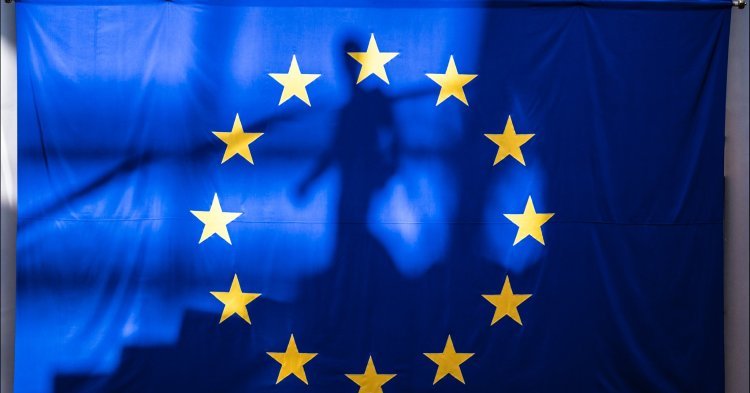In 2013, looking at data from the 2009 European elections and the 2009–2014 European Parliament, Zoe Lefkofridi and Alexia Katsanidou made this exact finding. [1] According to their study, all parties (apart from the left-wing GUE/NGL group) stood between their national-level member parties, and their voters, on the pro-integration/anti-integration axis. At the same time, all pro-European parties were more supportive of the EU than were their national-level member parties.
In other words, voters were comparatively pro-European, and it was the European-level parties that could better represent the voters’ opinion on this.
At the same time, according to the scholars, both citizens’ vote choice at European elections and parties’ choice of European-level alliance seem to be dictated rather by questions on the left-right dimension rather than by stances on EU integration. Given this information, we can be all the more pleased that European-level parties are close to citizens on questions of integration. Even if voters have other things in mind when they go to the ballots, EU-level parties have them covered.
In 2019, it’s Europe that counts
For a long time, pro-European movements have implored candidates and voters to focus on European affairs in European Parliament elections. In a 2018 paper, Zoe Lefkofridi and Alexia Katsanidou found that the divide between pro-European and anti-European groupings widened in 2009–2014. Intuitively, one would expect this to continue in the 2019 election that has already been dubbed as a big EU-wide ‘referendum on Europe’.
When you pull the puzzle together, the conclusion is somewhat encouraging. If the European-level parties represent us today like they did in the 2013 study, and if next year’s elections really are a vote on the direction of the EU, we can safely say that the electorate is going to get what it votes for. At the same time, the various pro-European movements aim to help pro-integrationist candidates to victory, and to increase the voter turnout. If the pro-Europeans succeed in these objectives, after the elections there will be a strong claim to make that the people gave our MEPs a mandate to pursue a stronger EU.





1. On 27 December 2018 at 14:43, by Ian Beckett Replying to: In May, will Europeans get what they vote for? There’s reason to believe the answer is yes
Replying to: In May, will Europeans get what they vote for? There’s reason to believe the answer is yes
Given that the vast majority of EU citizens now (and for many years past) simply fail to vote at all in what way exactly does the Parliament represent them more than national parties? Remember nation elections which mandate national parties have rates of voter turnout that the EP can only dream of. A cynic might suggest that the fall in voter turn out to such low levels over such a prolonged period in European elections is precisely because it makes no difference how they vote, the EP always moves towards more integration.
But then surveys after the 2014 election by the EU (https://www.euractiv.com/section/eu-elections-2014/news/commission-presidential-race-only-interested-5-of-european-electorate/ ) discovered that even amongst those who actually voted only 14% were in favour of the EU itself and only 12% felt that their vote made any difference. Hardly a ringing endorsement.
As an aside, re the election of the Commission President, I would remind you that the current incumbent failed entirely to campaign in several countries and in the case of the UK, Sweden, Hungary etc failed to secure the backing of any of the mainstream political parties. Immediately prior to the 2014 election only 7% of voters in Germany could even identify him. (https://www.bild.de/politik/ausland/europawahl/wie-wichtig-ist-die-europawahl-wirklich-35912854.bild.html ) So from a voter’s perspective it really does seem they are entirely disenchanted.
2. On 27 December 2018 at 15:28, by Juuso Järviniemi Replying to: In May, will Europeans get what they vote for? There’s reason to believe the answer is yes
Replying to: In May, will Europeans get what they vote for? There’s reason to believe the answer is yes
In response to Ian:
1) It’s a sad state of affairs that the turnout has been trending downwards in European elections. There’s a couple of things here that I’d like to pick up on, however. Firstly, political parties and media still tend to regard European elections as ’less important’, and these actors are key in getting people out to the polls. The European institutions (particularly the Parliament itself) are doing their best to promote the elections, but the responsibility can’t entirely be left to them or to civil society. Moreover, of course, there has been a downward trend in electoral turnout all across the board over the last four decades, so this is an issue the entire political system is grappling with.
2) The member states and the European Parliament have been pushing for more integration because the majority of (elected) national governments has always been led by traditionally pro-European forces, and because pro-European parties have always won (in elections, that is) a majority in the European Parliament. The generally pro-integration Commissioners, for are part, are nominated by the (elected) national governments, and accountable to the (elected) European Parliament. But of course, federalists would like to see more clear-cut legitimacy for the Commission!
3) As a quick look at the EurActiv article reveals, to say that “only 14% were in favour of the EU” is misleading. For 14%, being in favour of the EU was in one of the top 3 reasons why they voted. That reason was the fourth most popular of the 14 suggested options. (The “12%” statement is misleading in the exact same way.) When specifically asked if they believed EU membership is a good thing, in May 60% said it is: http://www.europarl.europa.eu/news/en/headlines/eu-affairs/20180522STO04020/eurobarometer-survey-highest-support-for-the-eu-in-35-years
4) I agree it’s bad for democracy that the Commission lead candidates aren’t known by citizens, and that they haven’t campaigned everywhere. This is why I constantly encourage the candidates themselves, and their parties, to take the Spitzenkandidaten campaign seriously. Writing articles is one way in which I’m doing my part in promoting awareness of the candidates!
3. On 27 December 2018 at 18:37, by Ian Beckett Replying to: In May, will Europeans get what they vote for? There’s reason to believe the answer is yes
Replying to: In May, will Europeans get what they vote for? There’s reason to believe the answer is yes
Thank you for taking the time and effort to reply.
I would point out to in return regarding the EurActiv article on the 2014 election that the greatest reason those that turned out to do so was as a sense of civic duty rather than any EU enthusiasm. Additionally a majority of respondents (both voters and abstainers) felt they had “all the necessary information” to vote (or not). I have tried repeatedly over the years to discover how much the EU spends on ‘public information’ and ‘raising its profile’. The best I have ever managed is the €2.4bn per year as quoted by Open Europe in 2006 (bigger than the PR budget of Coke Cola) but if you have more up to date information I would be very grateful for it. It does seem however that it is difficult to claim that voters were either unaware of the election, the matters of importance or the options open to them.
Regardless however, the fact remains that turn out for the EP elections has dropped every single time the vote has been held. In 2014 it was at 42%, the question is clearly how low can it go before the EP can no longer claim any mandate whatsoever, 40%, 35% ….? (Would you care to suggest a figure?) Don’t forget that this participation figure is inflated by the fact that some states oblige citizens to vote (e.g. Belgium). In 19 of the 28 nations less than 50% of people voted, in the three biggest states, all below 50% EP participation, the turn out in their own most recent national elections were 68 – 76% and, in the case of the UK it saw the fifth straight increase in voter turnout. Voter decline is not inevitable if people feel it is worth taking the effort.
With regards to the push for integration, we can agree that national and EU parties are in favour, unfortunately when the people are asked directly they have very frequently have taken the opposite position.
While you would classify me as ‘europhobic’, I do believe passionately in democracy, the need for the people to be heard, transparency of government, and the ability to hold those in power to account. Indeed the lack of these are my primarily objections to the EU as it is currently structured together with my view that has grown over the years that it is incapable of meaningful democratic reform. For these reasons I commend all journalists (yourselves included) who encourage debate and subject all politicians / institutions to the harsh and cleansing light of enquiry. Good luck in 2019, I genuinely hope the turn out rises and large swathes of people who have felt disempowered for years come to the ballot boxes and make their mark.
Follow the comments: |
|
